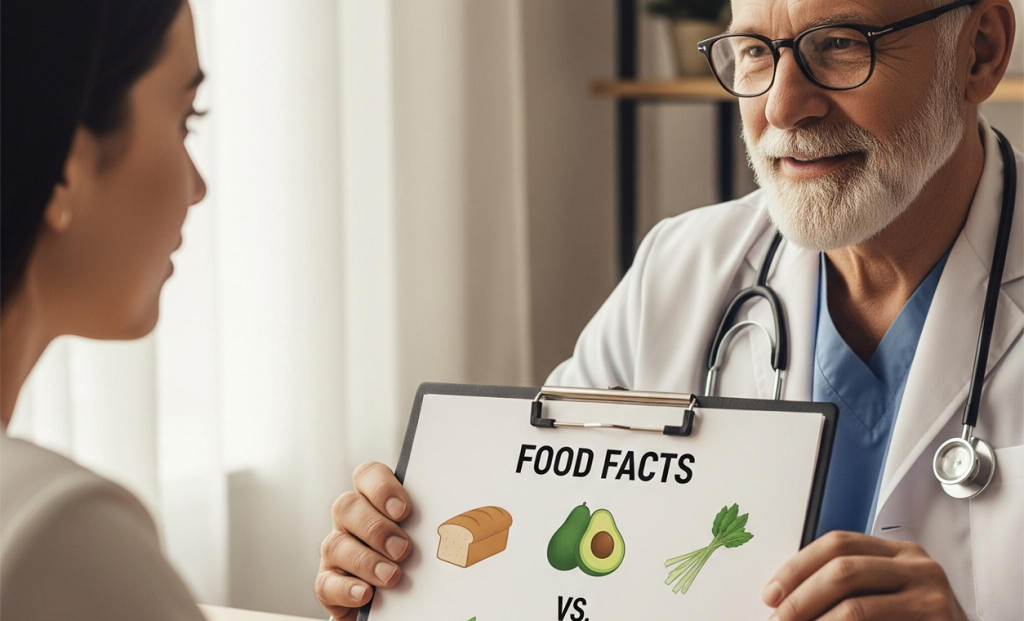
In a world of trending diets, social media influencers, and rapid health claims, it’s easy for misinformation about nutrition to spread. Many patients walk into primary care clinics with deeply ingrained beliefs about food—some of which can hinder progress toward better health. That’s where science-backed insights become crucial. FriskaAi helps clinicians and patients separate fact from fiction by offering evidence-based nutritional guidance that corrects common myths and supports sustainable habits.
Myth 1: Carbohydrates Are Bad and Should Be Avoided
One of the most common myths in modern dieting is that all carbohydrates are harmful and lead to weight gain. This belief has fueled the popularity of low-carb and ketogenic diets.
What the science says:
Carbohydrates are the body’s primary source of energy. Whole carbohydrates—like fruits, vegetables, legumes, and whole grains—are packed with fiber, vitamins, and minerals. The issue lies in refined carbs such as white bread, sugary snacks, and sodas, which can spike blood sugar and lead to energy crashes.
How FriskaAi helps:
FriskaAi evaluates individual blood glucose patterns, activity levels, and metabolic markers to create balanced nutrition plans. These plans recommend complex carbs in appropriate portions, helping patients understand that not all carbs are equal.
Myth 2: Eating Fat Makes You Fat
For decades, fat was vilified in the name of weight control and heart health. Many patients still believe that eating fat directly causes weight gain.
What the science says:
Healthy fats—like those from avocados, nuts, seeds, olive oil, and fatty fish—are essential for hormone production, brain function, and nutrient absorption. Weight gain occurs when total caloric intake exceeds energy expenditure, regardless of macronutrient source.
How FriskaAi helps:
By assessing a patient’s metabolic rate, goals, and nutritional history, FriskaAi recommends the right types and amounts of fats. This guidance teaches patients to incorporate fats wisely rather than eliminate them altogether.
Myth 3: Skipping Meals Helps with Weight Loss
Some patients believe that skipping meals—especially breakfast—is an effective way to cut calories and lose weight.
What the science says:
Skipping meals can lead to overeating later in the day, disrupted metabolism, and reduced insulin sensitivity. Studies show that regular, balanced meals help stabilize blood sugar and support sustainable weight loss.
How FriskaAi helps:
The platform analyzes users’ meal timing and metabolic data to deliver personalized eating schedules that optimize insulin response and energy levels. Patients learn that consistency—not deprivation—is the key to results.
Myth 4: Plant-Based Diets Lack Protein
With the rise in plant-based eating, concerns about protein intake often arise. Patients may assume that meat and dairy are the only reliable protein sources.
What the science says:
A variety of plant foods—like lentils, tofu, quinoa, beans, and chickpeas—provide sufficient protein when consumed in adequate amounts. Research supports that well-planned plant-based diets can meet all nutritional needs, including protein.
How FriskaAi helps:
FriskaAi suggests balanced meal plans tailored to vegetarian, vegan, or flexitarian preferences. It ensures that protein intake is adequate and diversified, helping users adopt plant-forward diets with confidence and clarity.
Myth 5: Detox Diets Cleanse Your Body
Detox teas, juice cleanses, and restrictive regimens are widely marketed as ways to “cleanse” the body of toxins.
What the science says:
The human body already has highly effective detoxification systems: the liver, kidneys, and digestive tract. There’s no scientific evidence that detox products accelerate this process. In fact, extreme detox diets can be nutritionally unbalanced and harmful.
How FriskaAi helps:
Rather than promoting gimmicks, FriskaAi supports liver and kidney health through sustainable dietary strategies—hydration, high-fiber intake, and antioxidant-rich foods. Users are guided to build daily habits that support natural detox functions long-term.
The Role of Clinicians in Nutritional Education
When patients are exposed to myths through media, friends, or outdated advice, it becomes essential for clinicians to provide trusted, science-backed corrections. However, time constraints and limited nutrition training can make this difficult in busy primary care settings.
FriskaAi becomes a powerful ally by delivering accurate, personalized education that busts myths and builds healthier mindsets. Through real-time, tailored feedback delivered via the app, patients gain the confidence to make lasting, evidence-based changes.





